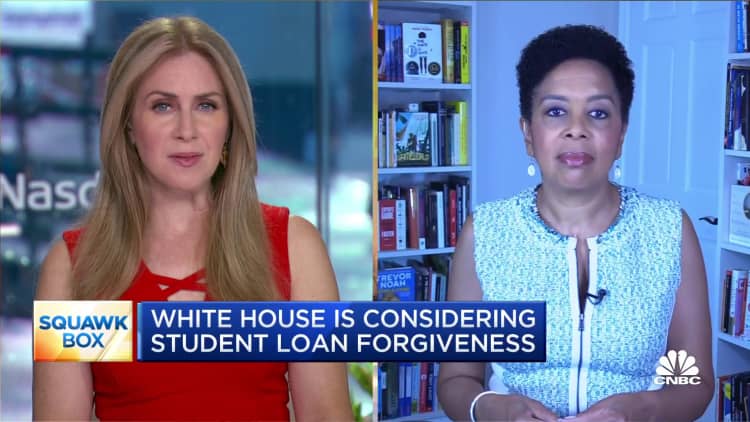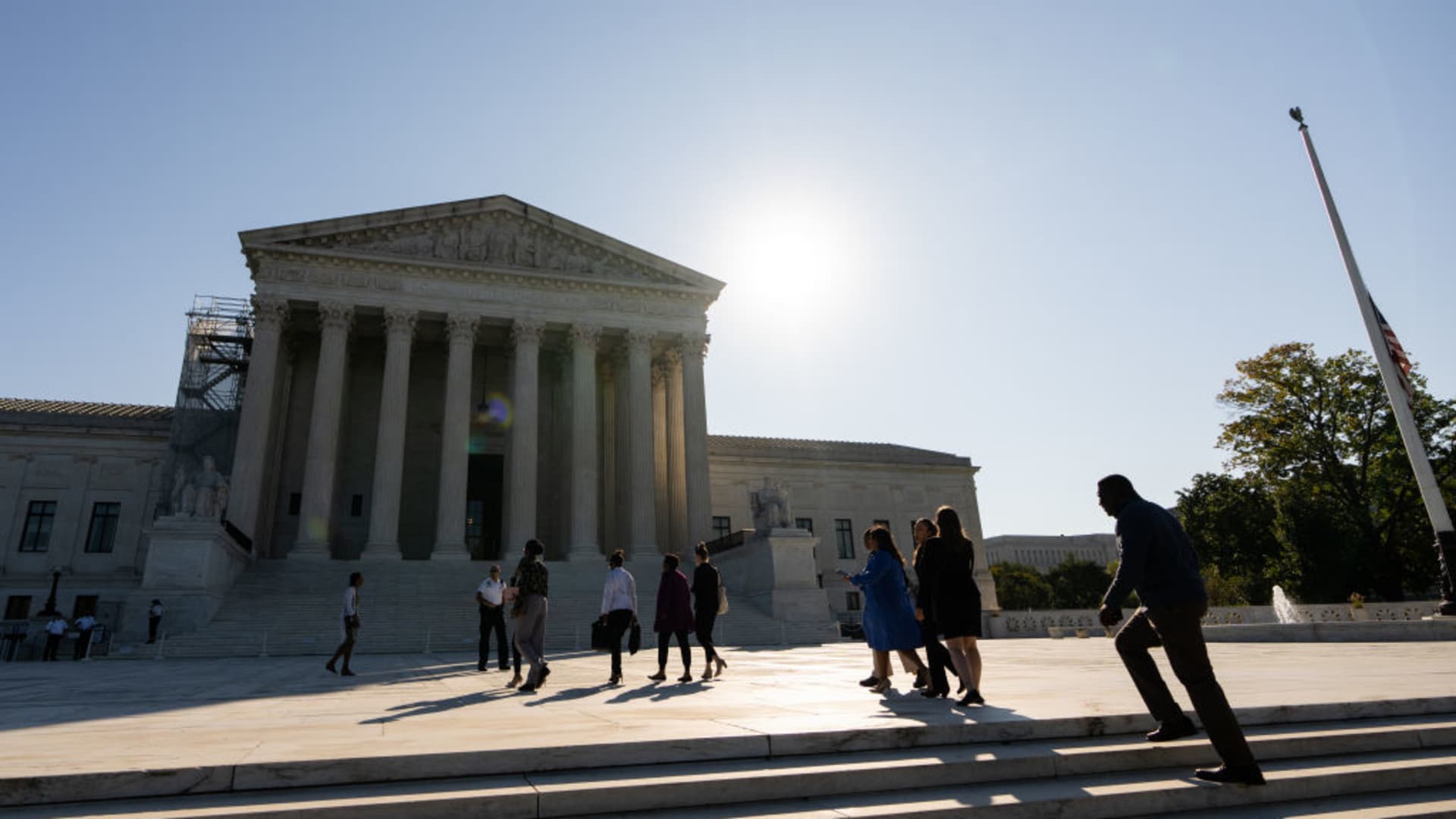Visitors walk across the U.S. Supreme Court plaza on the first day of the court’s new session on Oct. 2, 2023.
Bill Clark | Cq-roll Call, Inc. | Getty Images
The Supreme Court is set to hear oral arguments Tuesday in a case with the potential to gut the Consumer Financial Protection Bureau, a watchdog agency created in the wake of the 2008 financial crisis.
The case — CFPB v. Community Financial Services Association of America — hinges on the constitutionality of the agency’s funding. If the High Court sides with CFSA, a trade group representing payday lenders, its ruling could have broad and significant impacts for consumers, according to legal experts and consumer advocates.
For example, any rules the CFPB has issued in the past 12 years — whether about credit cards, mortgages, payday loans or debt collection, for example — could be nullified, experts said. Some regulators like the Federal Reserve and government programs like Social Security share a similar funding model to the CFPB’s; they may also be called into question.
More from Personal Finance:
Biden ESG rule survives challenge in court
IRS to target ‘unscrupulous’ tax preparers amid new crackdown
White House moves ahead with new plan to cancel student debt
“[The CFPB’s] future is on the line before the Court,” Better Markets, a consumer advocacy group, wrote Monday.
A ruling could come as late as June 2024.
Why the CFPB’s funding may be unconstitutional
The Consumer Financial Protection Bureau headquarters in Washington.
Samuel Corum/Bloomberg via Getty Images
The CFPB was established in 2011 by the Dodd-Frank financial-reform law in the wake of the Great Recession.
Lawmakers created the federal agency to protect consumers from predatory financial practices. To date, it has collected $17.5 billion in financial relief for about 200 million eligible people, according to agency data.
The recent case isn’t the first to pose a threat to CFPB operations. The Supreme Court ruled against the agency in a 2020 case, Seila Law v. CFPB, finding part of its structure to be unconstitutional but ultimately keeping the agency intact.
In the current case, the CFSA trade group sued the CFPB in 2018, seeking to invalidate a 2017 rule that cracked down on payday lenders.
[The CFPB’s] future is on the line before the Court.
The case was ultimately heard by the U.S. Court of Appeals for the Fifth Circuit, which ruled in October 2022 that the CFPB’s funding mechanism violated the Constitution’s appropriations clause.
The agency isn’t subject to annual appropriations, the budget process whereby Congress allocates funding to various parts of the federal government. (A breakdown of this process is what almost led to a government shutdown on Sunday.)
Instead, the CFPB’s funding isn’t authorized by Congress each year. It has an independent funding structure sourced through the Federal Reserve — an attempt to shield the agency from political pressures, experts said. Its director requests those funds each year, capped at 12% of the Federal Reserve System’s total operating expenses.
The Fifth Circuit ruled this structure was unconstitutional, and that the payday rule was therefore illegal.
Such a ruling appears to be unprecedented, the Congressional Research Service said.
“The Fifth Circuit’s decision is significant as the first appellate decision — and perhaps the first court decision ever — to conclude that congressional action, as opposed to executive or judicial action, can violate the Appropriations Clause,” it wrote.
Why the Supreme Court may gut the CFPB
If the Supreme Court were to agree, it could pose an “existential” threat to the agency, said John Coleman, partner at the law firm Orrick and former deputy general counsel for litigation at the CFPB from 2016 to 2021.
For one, it’s possible that the agency would exist only as a shell of its former self.
“It would still exist as a creation of Congress,” Coleman said. “But if its funding stream is deemed unconstitutional, it cannot spend those funds, which calls into question how it pays its employees.
“Without employees, an agency can’t do anything.”
Rohit Chopra, director of the CFPB, testifies during a House Financial Services Committee hearing on June 14, 2023.
Tom Williams | Cq-roll Call, Inc. | Getty Images
Additionally, such a ruling would call into question the agency’s past and future rulemakings, experts said.
“[It] could cast legal doubt over every substantive action that the CFPB has taken since at least July 21, 2011, when the Bureau’s authorities went into full effect, if not since its inception a year earlier, as well as any future Bureau action,” the Congressional Research Service said.
“This would include myriad regulatory actions, such as dozens of rulemakings, enforcement actions, and examinations the Bureau has conducted over the past 12 years,” it added.
Such a ruling would have a “devastating” impact on the real estate industry, including the destabilization of the mortgage market, for example, according to a court filing made by industry groups including the Mortgage Bankers Association, the National Association of Home Builders and the National Association of Realtors.

Numerous other government agencies and programs are funded outside the annual appropriations process, said Rachel Gittleman, financial services outreach manager at the Consumer Federation of America.
They include, among others: the Federal Reserve, Federal Deposit Insurance Corporation, Office of the Comptroller of the Currency, Federal Housing Finance Agency, National Credit Union Administration, Farm Credit Administration, Farm Credit Insurance Corporation, Medicare, Medicaid, Social Security, the Affordable Care Act and unemployment benefits, she said.
Such an outcome is unlikely, however, Coleman said. If it were to rule against the CFPB, the High Court would likely preserve the validity of CFPB’s past rulemakings and give Congress some time to determine an alternative funding mechanism, he said. (Of course, the latter might be difficult in a divided Congress during an election year, he said.)
“We’ll know a lot more on Tuesday after we hear from the justices,” Coleman said.








